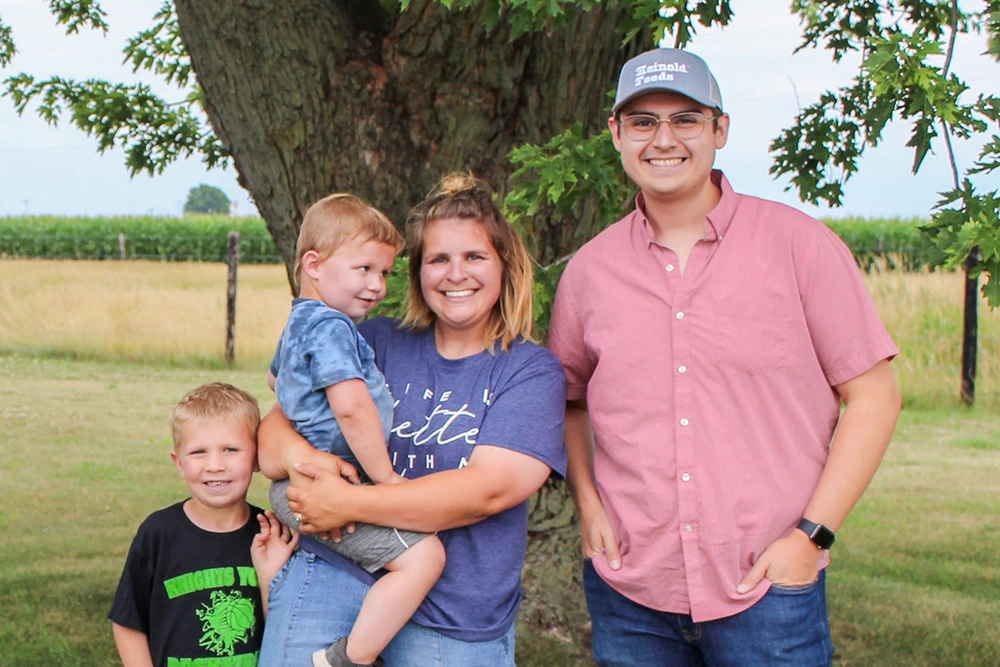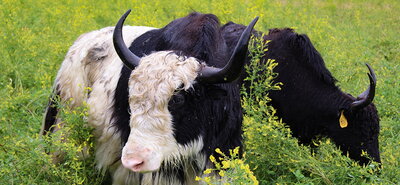
University of Illinois Urbana-Champaign history doctoral student Dale Mize is using storytelling to help raise awareness about food sourcing through summer research interviews on three area farms that use sustainable practices and regenerative land use systems.
He is one of five students participating in the 2024 Humanities Without Walls Summer Bridge experience through the U. of. I. Humanities Research Institute. Individuals selected for the paid fellowship connect with an organization, identify an area of need, and collaborate to design and implement a project to address the need.
We CU community engaged scholars, a university initiative that supports partnerships between local organizations and service-learning instructors, facilitates the collaborations. Mize is working with The Land Connection, a Champaign nonprofit that helps farmers improve environmental, ecological, economic and quality of life outcomes for their operations.
“My project educates people about regenerative, or sustainable, agricultural practices and highlights farmers in the area currently doing this work,” Mize said. He is studying agricultural history. His project’s primary focus is on beef cattle from historical and health perspectives. He has visited beef, pork and poultry farms, and has also been to ones that have yaks and sheep.
There is an overarching altruistic quality to the work. “As we think about climate change and the issues the planet faces and will continue to face, we must understand humans’ interactions with the environment and move toward practices that prolong the health of the Earth,” Mize said.
His fieldnote narratives will be circulated on The Land Connection blog, newsletter and social media. They will also be available for use by the three farms he visited: Cow Creek Organic Farms in Paxton, Savannah Ridge Farms in Indianola and Crider Farms in Farmer City.
Regenerative agriculture revitalizes topsoil through several practices that include crop rotation, reduced tillage and chemical-free, natural fertilization. Restoring the land through these measures is considered vital by safeguarding food production, sustaining biodiversity, improving water quality, mitigating global warming effects through carbon capture and other benefits.
Organic meat production in combination with sustainable agriculture practices ensures that animals are raised without growth hormones, synthetic pesticides, fertilizers or antibiotics.
Mize said the interviews have helped his understanding of the challenges that some farmers encounter. “While working on this project, several family members I interviewed mentioned that educating consumers and marketing their products was one of the struggles they faced,” Mize said. “My hope is that by sharing their stories and highlighting the products they produce in a blog post, The Land Connection’s newsletter, and on social media, community members will engage with those families and become potential consumers of their products.”
Humanities Without Walls is a consortium that links humanities centers at 16 research universities. It is funded by the Andrew W. Mellon Foundation. The consortium is based at the Humanities Research Institute and is led by Antoinette Burton, director.
Burton hopes students “will have a meaningful collaborative experience with the partnering organization, learn something about what it means to work in the nonprofit sector and come away with an appreciation for the opportunities and challenges of bringing their Ph.D. skills into a different workplace than academe.”
The immersive experience allows students to participate in board and staff meetings and engage in other basic functions of a nonprofit.
“The projects we design for participants are similar to the work our team is actively doing,” said Jacquelyn Evers, the executive director of The Land Connection. “This on-the-ground experience gives the participant experience to include on their resume as they look for jobs, while also providing our organization additional programming that we otherwise would not have pursued.”
Evers said part of the mission of The Land Connection is to ensure consumers know the sources of their food and why that matters.
“The project Dale is pursuing takes the stories of area food producers and tells them in an engaging way that consumers can easily read and understand,” she said. “Even though the consumer is benefitting directly from the information being shared, which is hopefully new and interesting to them, the farmer benefits indirectly by potentially seeing new customers interested in engaging with them and their products offered.”
While Mize, a first-generation college student, is also a self-described Michigan “farm kid” who during years of 4-H activities “showed every single animal you can find at a county fair,” the Summer Bridge project led to a surprise.

“I had never seen yaks before,” he said. “They brought them over because they’re easier on the land.” According to the Savannah Ridge Farms website, yaks consume less grass per acre than cows. The farm has about 60 of the shaggy, organically raised bovines.
The Humanities Without Walls Summer Bridge experience is in its fourth year. “Thanks in part to our collaboration with We CU and Olivia Hagedorn, the bridge coordinator, we are able to realize our commitment to reciprocity and redistribution when it comes to approaching the partners for each bridge fellow’s work,” Burton said.
The other 2024 Summer Bridge fellows are Abigail Houkes, anthropology, who is working with an organization that provides immigration legal assistance; Virginia Leach, sociology, who is working to help provide supports for people affected with HIV and AIDS; Aubrie Powell, musicology, who is contributing to a community school dedicated to uniting people through music; and Andrés Martinez Ruíz, art education, who is engaged in a project with Krannert Art Museum.
Editor's note: This story originally appeared on the News-Bureau website.